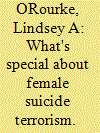|
|
|
Sort Order |
|
|
|
Items / Page
|
|
|
|
|
|
|
| Srl | Item |
| 1 |
ID:
092891


|
|
|
|
|
| Publication |
2009.
|
| Summary/Abstract |
Strikingly, little systematic study of the relationship between democracy and terrorism has been undertaken. This article addresses this lacuna by laying some groundwork for further analytical study of the issues. It does so, first, by suggesting a family of independent variables related to the concept of political access that might be employed in this research; and second, by introducing a more expansive set of dependent variables, which will help capture the diverse effects of political access on militant group activity. The bulk of the paper examines the variety of causal logics that could potentially connect democracy and terrorist group activity, drawing from five analytical approaches to understanding terrorist motivation evident in the literature. Two major conclusions follow from the analysis. First, the democracy and terrorism debate constitutes not one research question, but many. Second, the prediction that follows from many approaches to terrorist motivation is not that democracy should promote an easy, inevitable lessening of terrorism. Rather, a more refined understanding of when democracy, or other forms of political access, may reduce violence or yield other desirable (and undesirable) outcomes is essential.
|
|
|
|
|
|
|
|
|
|
|
|
|
|
|
|
| 2 |
ID:
092886


|
|
|
| 3 |
ID:
092888


|
|
|
|
|
| Publication |
2009.
|
| Summary/Abstract |
This study analyzes the interaction between the motivations of individual attackers and terrorist group strategies. To do so, I combine a quantitative analysis of all known suicide terrorist attacks between 1981 and July 2008 with a strategic account of why terrorist organizations employ female suicide terrorism (fst) and case studies of individual female attackers. I advance five central claims. First, I reveal the superior effectiveness of fst from the perspective of the groups that employ women. Second, I explain that terrorist groups increasingly enlist women as suicide attackers because of their higher effectiveness. Third, I demonstrate that terrorist groups adapt their discourse, catering to the specific individual motives of potential female suicide attackers in order to recruit them. Fourth, I show that female attackers are driven by the same general motives and circumstances that drive men. Furthermore, and in contrast to the existing literature, women attackers uphold, rather than eschew, their societies' norms for gender behavior. Attempts to transform these societies into gender-neutral polities are therefore destined to increase fst. Finally, I conclude that, unless target states adapt their defensive strategies, we should expect an increase in fst.
|
|
|
|
|
|
|
|
|
|
|
|
|
|
|
|
| 4 |
ID:
092890


|
|
|
|
|
| Publication |
2009.
|
| Summary/Abstract |
Leadership targeting has become a key feature of current counterterrorism policies. Both academics and policy makers have argued that the removal of leaders is an effective strategy in combating terrorism. However, leadership decapitation is not always successful, and existing empirical work is insufficient to account for this variability. As a result, this project answers three primary questions: (1) Under what conditions does leadership decapitation result in the dissolution of a terrorist organization?; (2) Does leadership decapitation increase the likelihood of organizational collapse beyond the baseline rate of collapse for groups over time?; and (3) In cases where decapitation does not result in group collapse, to what extent does it result in organizational degradation and hinder a group's ability to carry about terrorist attacks? I develop a dataset of 298 incidents of leadership targeting from 1945-2004 in order to determine whether and when decapitation is effective. First, I identify the conditions under which decapitation has been successful in bringing about organizational decline. The data show that a group's age, size, and type are critical in identifying when decapitation will cause the cessation of terrorist activity. As an organization grows in size and age, it is much more likely to withstand the removal of its leadership. Organizational type is also significant in understanding the susceptibility of an organization to decapitation. Ideological organizations are most likely to experience a cessation of activity following the removal of leader, while religious organizations are highly resistant to leadership decapitation.
|
|
|
|
|
|
|
|
|
|
|
|
|
|
|
|
| 5 |
ID:
092887


|
|
|
|
|
| Publication |
2009.
|
| Summary/Abstract |
Why do individuals participate in weak-against-strong resistance, terror, or insurgency? Drawing on rational choice theory, many claim that individuals join insurgent organizations for self-interested reasons, seeking status, money, protection, or rewards in the afterlife. Another line of research, largely ethnographic and social-network based, suggests that prospective fighters are driven by social identity-they join out of an allegiance to communal values, norms of reciprocity, and an orientation toward process rather than outcome. This article tests these two lines of argument against each other by directly linking values orientations in a refugee camp to professed willingness to participate in resistance or rebellion in two different contexts. Professed willingness to participate in resistance, and especially in violent rebellion, is positively correlated with communal orientation and negatively correlated with self-enhancement values. The strength of correlation grows-negatively for self-enhancement and positively for communal orientations-as anticipated sacrifice increases. Results are discussed.
|
|
|
|
|
|
|
|
|
|
|
|
|
|
|
|
|
|
|
|
|